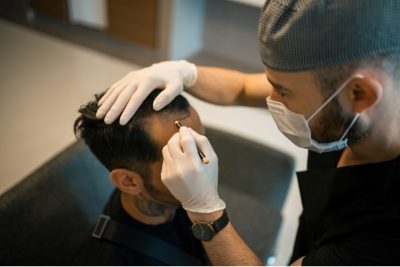A hair transplant performed by a qualified and experienced surgeon is a safe, effective, and permanent solution to hair loss. In most cases, the procedure delivers positive results that meet or exceed the patient’s expectations. However, in rare cases, a hair transplant can fail to achieve a desired result.
effective, and permanent solution to hair loss. In most cases, the procedure delivers positive results that meet or exceed the patient’s expectations. However, in rare cases, a hair transplant can fail to achieve a desired result.
If you’re experiencing hair loss and have concerns about how successful a hair transplant may be for you, it’s important to understand the factors that can contribute to an unsuccessful transplant. Read on as we share the most common reasons a hair transplant may fail and how you can improve your chances of achieving your desired results.
Incorrect Diagnosis of Hair Loss
While most hair loss is genetic, it can also be caused by a hormone imbalance, nutrient deficiency, certain medications or illness, severe stress, a traumatic life event, and a variety of other factors. If the hair loss is not diagnosed correctly and the underlying causes left untreated, a surgery may be recommended for someone who should not have one. It’s important to consult with a trusted hair restoration surgeon who can properly evaluate your hair loss and make a recommendation in your best interest.
Inexperienced Surgeon
An inexperienced or unqualified surgeon can cause serious damage to the hair and scalp, resulting in complications, scarring, or infections. Additionally, they may overlook a treatment or procedure that would have garnered better results. Do your research, ask questions, ask to see several recent before and after pictures specific to your hair type and area of hair loss. Choosing a qualified surgeon is vital to a safe and successful hair transplant.
Not Being an Ideal Candidate
Not everyone is a suitable candidate for hair restoration surgery. As mentioned earlier, the hair loss may be temporary or reversible and therefore a hair transplant would not be necessary. Or perhaps the patient is too young and the hair loss has not had a chance to run its course; as the patient continues to lose more hair, the graft may not be in the right area or large enough to cover the balding area. Consult with a trusted hair restoration surgeon to determine whether you are a good candidate for a hair transplant.
Bad Post-Operative Care
The success of a hair transplant is also largely dependent on how well a patient follows their surgeon’s post-op care instructions. After surgery, the new graft and scabbed shafts are quite fragile. Washing your hair and scalp too soon, ignoring activity restrictions, and skipping post-op office visits can greatly reduce your chances of having the healthy, natural head of hair you expected. Worse, it can lead to infection and scarring.
Choose Your Hair Restoration Surgeon Wisely
While a hair transplant is a minimally-invasive and low risk procedure, it’s not something to be taken lightly. Choose your surgeon carefully; look for one with experience, training in the latest hair restoration technology, and one who will take the time to listen to your concerns, assess your hair loss and its potential underlying causes, and discuss the treatment options that make the most sense for you.
At DiStefano Hair Restoration Center, we do all that and more so that you get the real, permanent results you want and deserve. Contact us today for a free consultation.


